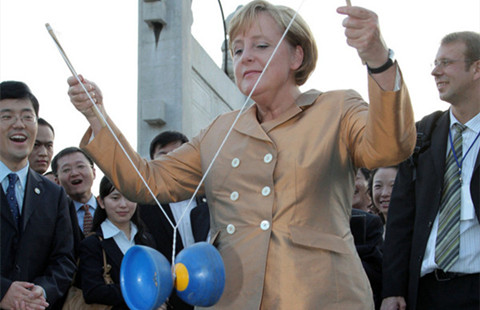Most industrialized countries face decline in problem-solving ability
By Fu Jing in Brussels ( chinadaily.com.cn ) Updated: 2016-08-18 14:37:39The ability to solve problems is declining in most industrialized countries, with the trend becoming obvious in the past two years, according to the Sustainable Governance Indicators, a study conducted annually by Germany's Bertelsmann Stiftung, a respected think tank.
Although China is not part of the study, which was made public on Thursday, Qi Ye, director of the Brookings-Tsinghua Center for Public Policy at Tsinghua University, said China had made significant progress in enhancing governance capability since the end of 2012, when the current leadership took power.
President Xi Jinping's administration has focused on economic restructuring, poverty alleviation and radical anti-corruption measures at home and a cooperative win-win global strategy.
The German study is published at a crucial time as China prepares to host its first-ever G20 summit in Hangzhou in September, a forum which groups the world's largest economies plus the European Union.
The SGI showed the United States governance performance fell below the average of the 41 industrialized nations of the OECD and EU, with Scandinavian countries overall achieving the best results.
Sweden ranked first, followed by Switzerland and then Germany. Of the largest national economies, only two G7 countries, Germany and the United Kingdom, are among the top ten.
The SGI study applied 136 indicators to assess the government actions and reforms of all countries of the EU and OECD. More than 100 international experts took part in the study, which has been published every year since 2009.
"If the OECD and EU countries wish to improve their future viability, they must focus on strengthened cooperation and coordination as well as policies aiming for long-term solutions rather than national isolationism," said Aart De Geus, Chairman and CEO of the Bertelsmann Stiftung.
De Geus also said the political systems in the Nordic countries and New Zealand were particularly well-placed in this respect and the fact that they are at the top of the SGI Governance Index means they could serve as models of good governance and accountability for other countries.
Although the Nordic countries still have the best scores in future viability, even their position is beginning to waver in light of the growing social inequality in the region.
According to the study, the global debt crisis remains unresolved, especially in the southern countries of the Eurozone, and an alarmingly high number of people are at risk of poverty.
"The divisions in the EU are also hardening given the biggest flow of refugees since World War II, and the European integration project is in danger of failing, with national populism gaining ground in many EU and OECD countries, from Hungary, Poland, and France to the UK, Germany, and the US," the report was cited as saying.
 |
|
A woman sits by a wire fence with laundry hanging on it, while children play around her outside of disused Hellenikon airport, where stranded refugees and migrants are temporarily accommodated in Athens, Greece, August 10, 2016. (Photo/Agency) |
The research team also pointed out that from the financial and economic crisis to climate change, terrorism, and international migration flows, problems are becoming increasingly global.
"Yet, there are fewer and fewer opportunities for mutual problem solving because (right-wing) populist movements are gaining ground in a number of OECD and EU countries and placing particular national interests ahead of the objective of joint international policy solutions," the report was cited.
It also warns that in light of these developments, the EU faces the greatest test in its history and is miles away from finding mutual solutions and even outside the EU, the trend toward right-wing populism can clearly be seen, citing the election campaign in the United States as an example.
Daniel Schraad-Tischler, a senior analyst at Bertelsmann Stiftung, said the decline in problem-solving capacity, due to political polarization in many countries, represents a massive challenge, given the growing number and intensity of transnational problems and crises.
"With regard to transnational challenges such as terrorism, global migration flows, climate change, resource scarcity, and growing social inequality we would need governments that are capable and willing to act in a long-term oriented, internationally coordinated manner," said Schraad-Tischler. "But unfortunately, we often observe the contrary to such an approach."
With the Hangzhou summit only days away, he said the G20 governments bear a strong responsibility to act together in order to promote global public goods. "The trend of nationalist populism in some of the leading OECD countries should thus be seen as a serious cause for concern," said Schraad-Tischler.
Tsinghua's Qi said progress in China was down to four achievements at home and abroad.
First, the nationwide anti-corruption campaign has built political solidarity between the people and leadership, and to a large degree the ruling party has regained the trust of the citizens.
Secondly, China has maintained an enviable economic growth at an annual rate close to seven percent,higher than almost all major economies, despite the economic slowdown. Thirdly, environmental regulation is at its best, with more stringent legislation, tougher enforcement and better compliance.
"And fourthly, China's capacity in global governance has been enhanced significantly," said Qi.
He said that the development of a joint agreement with the US on Climate change helped set an important foundation for the success of the Paris Agreement; G20 Presidency is seen as offering a significant step towards agenda setting and consensus building; even the turbulent South China Sea situation seems to have calmed since the controversial arbitration decision, now that China and ASEAN countries have found more common ground and a willingness to cooperate.
However, Qi also named three challenges facing China.
First, Central-local relations seem to be deteriorating due to sluggish responses from local officials to calls and mandates from the central government.
Secondly, reform on government-market relations has been slower than anticipated; special interests, especially in some of the state-owned enterprises, have been resistant to many of the reform measures.
"Thirdly, civil society remains weak in its role in governance of public affairs. Legislation on international NGO's has drawn criticism from the international community," he said.
To contact the reporter: fujing@chinadaily.com.cn
|
|
|
|
|
|
|
|
Features
 Merkel's lighthearted moments in China
Merkel's lighthearted moments in China  British pub becomes tourist attraction after Xi's visit
British pub becomes tourist attraction after Xi's visit
European Weekly
 We will not give up search, Li vows
We will not give up search, Li vows
International hunt for missing airliner continues after fruitless six-day search




















